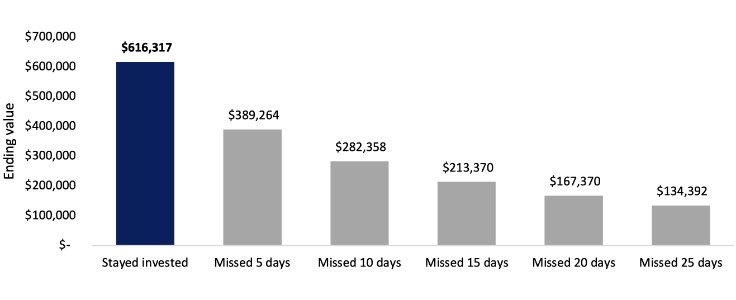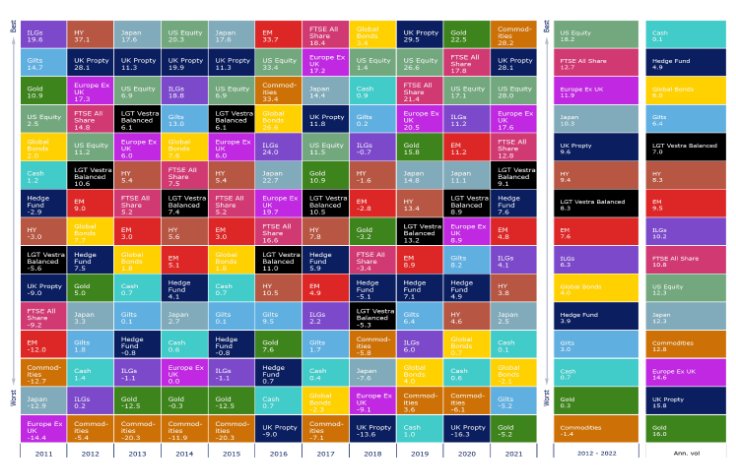Timing the market
Wednesday 25 May, 2022
Time in the market
"Far more money has been lost by investors preparing for corrections, or trying to anticipate corrections, than has been lost in corrections themselves." – Peter Lynch, Mutual Fund Manager
During periods of heightened financial market volatility, and increased levels of uncertainty, it can be tempting to try and time the market by selling assets and then buying back at a later stage. However, timing the market is virtually impossible, even for the most experienced investors. This is why it's often said that time in the market is more important than timing the market.
As investors, we are often too emotional about the decisions we make. When markets dive, too many investors panic and sell; when stocks have had a good spell, too many investors go on a buying spree. Many investors try to time the market, however, having such a short-term horizon can harm performance and jeopardise your long-term financial objectives.
People tend to ‘panic sell’ based on their past experiences. There have been six major crashes in the past 30 years, so psychology plays its part.
- 1987 Black Monday
- 1997 Asian economic crash
- 1998 Russian economic crisis
- 2001 Tech stock crash
- 2008 global financial crisis
- 2020 COVID-19 selloff
It is never an easy ride on the way up in a bull market. Investors seem perpetually concerned, worried about the valuation levels, forever peering around the next corner and ever watching for the canaries in the coal mine that might signal the onset of the next market downturn. Prospect theory from behavioural finance suggests that investors are more likely to focus on gains rather than the perceived risk of loss when the outcome of an investment is uncertain. This ties into regret aversion and the fear of a loss outweighs the joy of winning – hence many investors panic sell when the going gets tough. This is a large reason why investors are always encouraged not to look at their investments every day.
The pace at which markets react to news means stock prices have already absorbed the impact of new developments and when markets turn, they turn quickly. Those trying to time their entry and exit may actually miss the market bounce. Timing the market is predicting the future and you could end up being out of the market when it unexpectedly surges upward, potentially missing some of the best performing days.
No one can consistently pick the best or worst days of the year, so this is why it can be so dangerous for investors to miss time in the market by trying to time the market. If you miss one or two big days, compounded over time, this can greatly impact your portfolio.
The graph below illustrates how a hypothetical $100,000 investment in the S&P 500 Index would have been affected by missing the market’s top performing days over the 20-year period from 1 January 2002 to 31 December 2021. For example, an individual who remained invested for the entire time-period would have accumulated $616,317, while an investor who missed just five of the top performing days during that period would have accumulated only $389,263.
The benefit of staying invested
 Source: BlackRock, Bloomberg
Source: BlackRock, Bloomberg
Adding to the difficulty of trying to time the markets, most of the best days happen around the worst days. Over the last 20 years, 70% of the best 10 days happened within two weeks of the worst 10 days (Source: Factset). Incessantly going in, and out, of the market erodes returns and can also have tax implications and transaction costs.
It is true that a broken clock is right twice a day and hindsight is wonderful, but we are not soothsayers. If it was easy to time the market, lots of investors would be doing it and retiring early in the Bahamas, but this is not the case. We must remember that short-term volatility is the price you must pay for the chance of higher long-term returns and let the power of compounding take effect rather than potentially crystallising losses.
Diversification
Avoiding all risk is impossible but we must look at what we can control in the investing world – having a well-diversified portfolio that can weather the stormy financial markets is one.
 Source: Morningstar
Source: Morningstar
As can be seen in the above table, asset classes perform well at different points of the market cycle and having exposure to these in a balanced portfolio is imperative for risk adjusted volatility management.
Important information
This document is a marketing communication which is provided for informational purposes only and is intended for confidential use by the recipient. It is not to be reproduced, copied or made available to others. This is not an investment research report as defined by the Financial Conduct Authority and has not been prepared in accordance with legal requirements designed to promote the independence of investment research. The information presented herein is insufficient for making an informed investment decision. This document is considered to be a general market commentary and does not constitute advice or a personal recommendation or take into account the particular investment objectives, financial situations or needs of individual clients. This document is not intended and should not be construed as an offer, solicitation or recommendation to buy or sell any investments. You are recommended to seek advice concerning suitability of any investment from your investment adviser.
Past performance is not a reliable indicator of future performance; and the value of investments, as well as the income from them can go down as well as up, and investors may get back less than the original amount invested.
The information and opinions expressed herein are based on current public information we believe to be reliable; but we do not represent that they are accurate or complete, and they should not be relied upon as such. Any information herein is given in good faith, but is subject to change without notice. No liability is accepted whatsoever by Lonsdale Services or its employees and associated companies for any direct or consequential loss arising from this document. This document is not for distribution outside of the United Kingdom.
Lonsdale Services Limited is authorised and regulated by the Financial Conduct Authority. Financial Services Register number: 225488.The Financial Conduct Authority does not regulate Estate Planning, Lonsdale Pension Trustees Ltd, Tax Planning, Offshore Investments or Lifetime Financial Planning. The value of tax relief depends on your individual circumstances. Tax laws can change.
Registered in England: 04573693. Registered Office: 3 Curo Park, Frogmore, St Albans, Hertfordshire, AL2 2DD.




